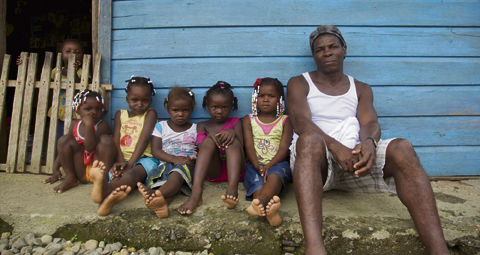September 5 | ![]() 0 COMMENTS
0 COMMENTS ![]() print
print

Taking care of business
As well as providing direct aid to people in need in poor countries, it is vital that we identify and tackle the root causes of poverty. SCIAF’S Jo O’Neill reports on how big business needs to put people, and not profit, at the heart of its decisions, if we are to create a more just world
THE latest attacks in the northern Nigerian city of Kaduna have prompted renewed fears about the descent of Africa’s most populous nation into bloodshed, chaos and civil conflict.
Many people believe economic growth, progress, and development are the same and that the free market is the solution to all of the world’s challenges. At the Scottish Catholic International Aid Fund, we don’t.
While big companies have enjoyed increasing profits and power and the number of billionaires grows, the world’s poorest people are being excluded. If business is to be a force for good for us all—including our poorest sisters and brothers—some important changes are needed.
Through our work with communities in developing countries, SCIAF knows the powerful role business can play in reducing poverty. In South Sudan we’re helping people living with disabilities to start their own shops and in the Great Lakes region of Africa we support survivors of sexual violence to establish small businesses. These local, sustainable businesses have helped many people to work their own way out of poverty. Jobs have been created, markets stimulated and local economies helped to grow. Business can help people to work their way out of poverty.
But SCIAF also knows that the activities of some big companies are having a very different impact on the lives of poor women and men. In Colombia, we work with poor Afro-Colombian and indigenous people, where communities already devastated by a 50-year civil war are now facing a new threat to their land and ability to support themselves—the economic interests of big business. Foreign mining companies are being awarded huge areas of Colombian land to exploit, often without any consultation with the communities who have lived on the land for generations and who depend on it for their way of life.
In Chocó, a region in Colombia well-known for its vast stores of natural resources, we have been supporting communities along the Atrato River to gain the land title for their territory. In 2011, after 12 years of struggle, the Colombian Government finally awarded the communities a land title for part of their territory—only for it to be discovered that parts of their territory had been promised to foreign mining companies keen to extract precious minerals.
Community members fear large-scale mining will have a significant impact on their environment and their ability to hunt and grow food. One community member, a mother of four, told us: “If the big mining companies come it will be very difficult. If they come with big diggers it will destroy our environment… That will mean only bad things for us. We don’t want them.” For Afro-Colombian and indigenous communities, the land has a cultural and spiritual significance. It is much more than a mere commodity.
Sadly the communities in Chocó are not alone in their struggle. Around the world, big business has been involved—either directly or—in human rights abuse, tax-dodging, and damaging the environment.
As companies drive to make greater profits by cutting costs we are witnessing a race to the bottom where ethical standards are being badly compromised. The collapse of the Rana Plaza garment factory in Bangladesh last year, which killed 1,129 workers when they were reportedly ordered back into the building, after large cracks appeared in the lower floors, is a shocking example of the human cost of putting profits before people.
Such unethical practices can mean that some big businesses actually leave people much worse off. While we must recognise the positive role business can play in reducing poverty, we need to stop the negative impacts companies have when they are not properly regulated and put in place safeguards to protect workers and local communities.
Inspired by the social teaching of the Catholic Church, we believe that every human being possesses a basic dignity and worth that comes from God. Human beings cannot be seen as mere economic units. We must shift the focus away from the relentless pursuit of economic growth towards an approach that prioritises the well-being and holistic development of everyone. After the economic crisis in 2008, Pope Benedict XVI reminded us that the core purpose of economic life is not for the good of itself but for the good of human beings. The economy is there to serve the needs of people and not the other way around. Pope Francis has spoken about this more recently, warning us, “We can no longer trust in the unseen forces and the invisible hand of the market. Growth in justice requires more than economic growth.”
We need to avoid simplistic solutions that suggest private investment and economic growth are ‘miracle’ solutions to extreme poverty and injustice. Growth alone is not enough to tackle extreme poverty or promote human development. Despite periods of economic growth across the developing world, it is increasingly clear that the distribution of income is unequal, with those already well-off benefitting the most from economic booms.
We believe a shift is needed at the heart of our current economic model and that a successful economy is one which contributes to the well-being of everyone. As part of this shift, governments must move beyond the usual light-touch approach to business. They must ensure companies are open about their activities and held accountable for their impact on people and the planet.
There are some welcome changes already taking place. New EU rules mean that from 2016, large European companies will be required to report on their impact on society, human rights and the environment, and not just on their financial operations. For some European countries, this is an important step forward.
But much more is needed. In our recent report, Taking Care of Business, we call on the UK and Scottish governments to ensure businesses publish full details of the impacts they have.
At the same time, both governments should ensure that the UN’s Guiding Principles on Business and Human Rights—which set out the responsibilities for states and businesses in protecting and respecting human rights—are followed.
Public sector spending is another important way for governments to encourage good business practice. Scotland currently spends around £9 billion a year on all types of goods and services for the public sector. Forthcoming guidance to accompany the new Procurement Reform Act must reflect international standards like the UN’s Guiding Principles and help public bodies to award contracts to companies that behave ethically and responsibly, both at home and abroad.
SCIAF does not believe that all companies behave irresponsibly or that all business is bad. However, we live in a world, where one in eight people will go to bed hungry and our current economic system is not working for the world’s poorest people.
If big business is to benefit us all we must reflect on the words of Pope Benedict and Pope Francis and act to make sure people, and not profit, are at the heart of businesses and our economy.
– Taking Care of Business report in full http://www.sciaf.org.uk/component/option, com_docman/Itemid,/gid,216/task,doc_details/










